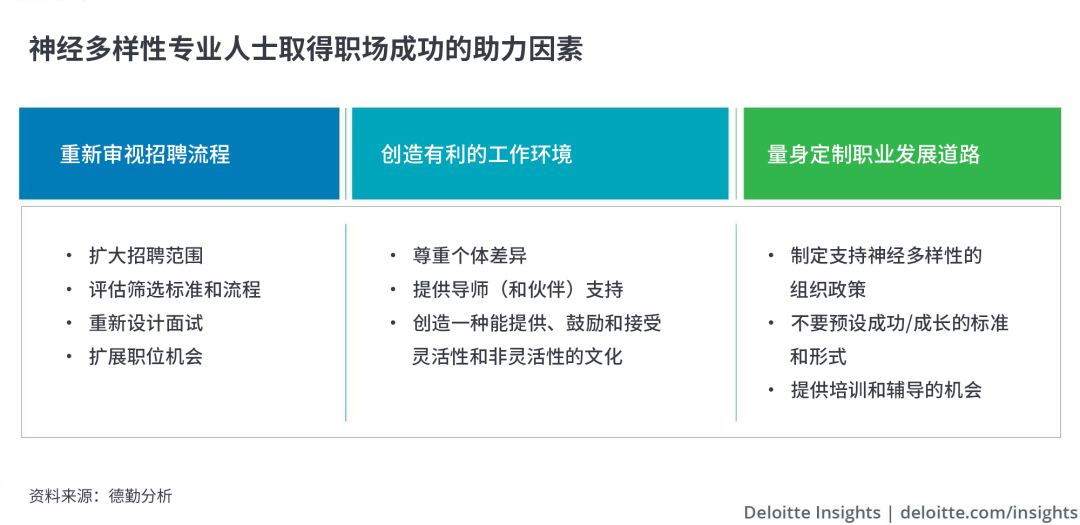,
:
Richard Jl Heron
Experts like Amy Edmondson from Harvard Business School believe that psychological safety empowers employees to take risks and be their authentic selves. This is especially crucial for neurodiverse employees, who often feel compelled to hide their true nature in order to fit into conventional workplace environments. Such masking not only adds unnecessary stress but also prevents them from making meaningful contributions to the organization.Openly discussing their neurodiversity experiences by senior leaders helps normalize the conversation. For instance, as many as 25% of CEOs believe they have dyslexia—or other learning differences—but few ever publicly acknowledge it. When leaders model inclusive behaviors, they set the tone for an organizational culture that values cognitive diversity, creating a space where neurodiverse employees can thrive without fear of stigma or embarrassment.How can companies create a more neuro-inclusive workplace?
:Deloitte
The benefits of a neuroinclusive workplaceNeuroinclusive companies can reap multiple benefits. Diverse perspectives foster innovation, strengthen team collaboration, and boost employee retention rates.Many countries have laws requiring accommodations for people with disabilities, such as the Americans with Disabilities Act (ADA) in the United States and Europe’s equality regulations. Some neurodivergent employees are already protected under these laws. As a result, adopting neuro-inclusive policies can also help reduce the legal risks associated with non-compliance. This approach not only provides essential legal safeguards but also encourages companies to develop more inclusive, comprehensive policies overall.In addition to ensuring compliance, simple workplace adjustments can also significantly boost the productivity and retention rates of neurodiverse employees. These adjustments are often free or low-cost and benefit all employees—not just those with neurodiversity. For instance, flexible working hours, sensory-friendly environments, and assistive technologies are just a few ways companies can foster a more inclusive work setting for everyone.The Role of the Chief Health Officer in Driving ChangeThe Chief Health Officer (CHO) is uniquely positioned to drive neuro-inclusion within the organization. Leveraging their expertise in health and wellness, they can help shape policies and practices that foster a psychologically safe environment for all employees—especially those with neurodiversity. Additionally, the CHO can collaborate on developing tailored training programs for managers and staff, ensuring that neurodiversity is seamlessly integrated into broader DE&I initiatives.Additionally, the CHRO can advocate for meeting the unique needs of employees with neurodiversity, tailoring the office environment specifically to their requirements. Such adjustments not only enhance individual performance but also boost the overall energy and dynamism of the team. By involving health experts in recruitment and talent management, companies can ensure that neurodiverse employees benefit from more equitable hiring practices and greater opportunities for career advancement.Practical steps to promote neuroinclusivityTo build a neuroinclusive workplace, companies should focus on the following key areas:- Leadership Commitment: Top-level leaders should champion neurodiversity and foster a cultural environment where all employees feel psychologically safe—empowering them to freely share their ideas and be their authentic selves.
- Neuroinclusive Hiring: Redesigning the recruitment process to focus on skills rather than personality, and evaluating neurodiverse individuals based on their strengths—rather than overlooking them due to traditional hiring biases.
- Tailored adjustments to the work environment: Simple workplace modifications—such as flexible hours, quiet spaces, or assistive technologies—support employees with neurodiversity.
- Training and Awareness Building: Invest in training for managers and employees on neurodiversity, helping to dispel misconceptions and equipping them with a deeper understanding of how to collaborate effectively with neurodiverse colleagues.
Neurodiversity unlocks a wealth of untapped talent, creativity, and innovation. Forward-thinking companies that embrace and actively promote neuroinclusion not only enhance the work lives of neurodiverse employees but also boost the organization’s overall performance.As we enter a new era of work, any comprehensive DE&I strategy must embrace neurodiversity as an integral component, since it empowers organizations to thrive in an increasingly complex and fiercely competitive world.By fostering a psychologically safe environment and providing tailored support, organizations can unlock the full potential of their employees, paving the way for a more inclusive, innovative, and productive future.
The above content solely represents the author's personal views.This article is translated from the World Economic Forum's Agenda blog; the Chinese version is for reference purposes only.Feel free to share this on WeChat Moments; please leave a comment below the post if you’d like to republish.
Translated by: Sun Qian | Edited by: Wang Can
The World Economic Forum is an independent and neutral platform dedicated to bringing together diverse perspectives to discuss critical global, regional, and industry-specific issues.
Follow us on Weibo, WeChat Video Accounts, Douyin, and Xiaohongshu!
"World Economic Forum"






